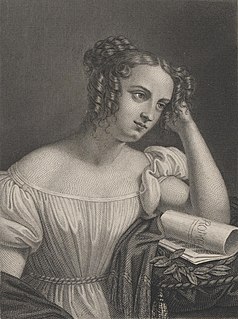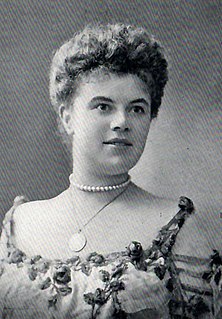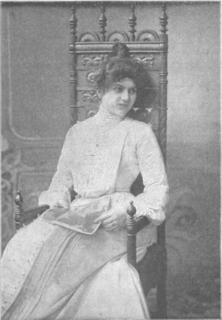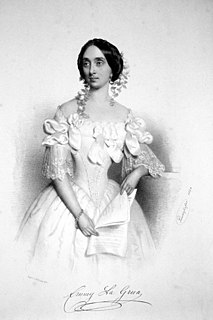
Friederike Funk, married name La Grua bzw. Funk La Grua (14 November 1796 - after 1863 [1] ) was a German operatic soprano and Royal Saxon Kammersinger in Dresden.

Friederike Funk, married name La Grua bzw. Funk La Grua (14 November 1796 - after 1863 [1] ) was a German operatic soprano and Royal Saxon Kammersinger in Dresden.
Born in Meissen, the daughter of a postmaster from her hometown received her vocal training from Johann Aloys Miksch in Dresden from 1813. In May 1816, she received her first engagement at the Dresdner Hoftheater under the direction of Francesco Morlacchi. Afterwards, accompanied by her brother and at the behest of the Saxon king [2] she spent two years in Italy to perfect her voice. She received this royal scholarship through the mediation of Morlacchi. [3] In Italy she performed among others in Naples and St. Carlo and took lessons in Naples with Niccolò Antonio Zingarelli and Luigi Mosca. In the autumn of 1818, now engaged at the Italian and German Operas in Dresden, she sang the title role in Rossini's Elisabetta, regina d'Inghilterra , and in 1822 Agathe in Weber's Der Freischütz . In 1824, she sang Eglantine in Weber's Euryanthe . She performed among others with the singers Anna Maria Neumann-Sessi [4] and Wilhelmine Schröder-Devrient [5] In 1827, after guest performances in Darmstadt, she went to Italy again, where she received an engagement in Palermo. After her marriage in Palermo to the tenor [6] Signor La Grua, she returned to Dresden in the 1830s, now under the name Friederike Funk La Grua, and worked as a singing teacher. Even after her marriage, she still performed sporadically [7] Lastly, she lived with her daughter Emmy, also a singer among others in Paris, Dresden, Vienna and Turin, as well as a singing teacher, in Paris. [8] Emmy La Grua received singing lessons from Pauline Garcia and Caroline Ungher-Sabatier. [9]

Wilhelmine Schröder-Devrient, born Wilhelmine Schröder, was a German operatic soprano. As a singer, she combined a rare quality of tone with dramatic intensity of expression, which was as remarkable on the concert platform as in opera.

Le Juif errant is a grand opera by Fromental Halévy, with a libretto by Eugène Scribe and Jules-Henri Vernoy de Saint-Georges.
Laura Polverelli is an Italian operatic mezzo-soprano who has sung leading roles in the opera houses of Europe and North America and has recorded on the Decca, Naïve, and Opera Rara labels amongst others.

Amalie Marie Joachim was an Austrian-German contralto, working in opera and concert and as voice teacher. She was the wife of the violinist Joseph Joachim, and a friend of Clara Schumann and Johannes Brahms, with whom she made international tours.
Philine Fischer, néeFranke, married name Sannemüller was a German opera and concert singer (soprano).

Agnese Schebest, néeAgnese Šebesta, also Agnese Schebesta was an Austrian operatic mezzo-soprano. She lived as a singing teacher in Munich and Stuttgart.
Louise Karolina Müller, néeLudovika Müller was an actress and operatic soprano. She appeared mostly in soubrette roles, but is known for performing as Marzelline at the premiere of Beethoven's Fidelio on 20 November 1805.
Gustav Heuser was a German composer and music journalist.

Eleonore de Ahna, occasionally also Leonore de Ahna, was a German operatic soprano/mezzo-soprano.

Helena Forti was a dramatic soprano active 1906 – 1924, closely associated with the Dresden royal court opera, known for her beauty, voice and strong stage presence. She sang all Wagner’s opera heroines, in Dresden, Bayreuth and internationally. Other repertoire included the title role in Verdi’s Aida, Santuzza in Cavalleria and contemporary works like Marietta in Korngold’s Die tote Stadt. She created the role of Mytocle in Eugen d’Albert’s opera Die toten Augen. Her Sieglinde in Die Walküre in Braunschweig was described by the Neue Zeitschrift für Musik as “Equally endowed with youth, beauty and vocal means... (Forti) immerses herself so intensely in her role that one believes the transformation of the virgin-Goddess into a human form.” After retiring from singing she taught voice and acting in Gera, Düsseldorf and Vienna. She died in Vienna, where she lived with her stage director and Intendant husband, Walter Bruno Iltz.

Ida Salden was a German operatic soprano
Mathilde Fröhlich was an Austrian operatic soprano.
Jenny Meyer was a German operatic alto, mezzo-soprano and music educator as well as director of the Stern Conservatory in Berlin from 1888 until 1894.
Eleonore Henriette Magdalena Grabau-Bünau, also Henriette Grabau or Henriette Bünau, was a German operatic alto and mezzo-soprano. For twelve years she was the main singer at the Leipzig Gewandhaus and from 1843 to 1849 she was the first teacher at the Leipzig Conservatory.
Gustav Scharfe was a German operatic baritone and voice teacher.
Charlotte Huhn was a German operatic contralto.
Christian Friedrich Gottlob Wilke was a German organist, composer, music teacher, music writer and organ revisor.

Emmy La Grua was a 19th-century Italian opera singer (soprano) who performed successfully internationally.
Friedrich Gustav Schilling was a German musicologist, editor and lexicographer.

Johann (Nepomuk) Aloys Miksch ; sometimes spelled Mie(c)ksch or Johannes) was a Bohemian singer, (tenor) and singing teacher.